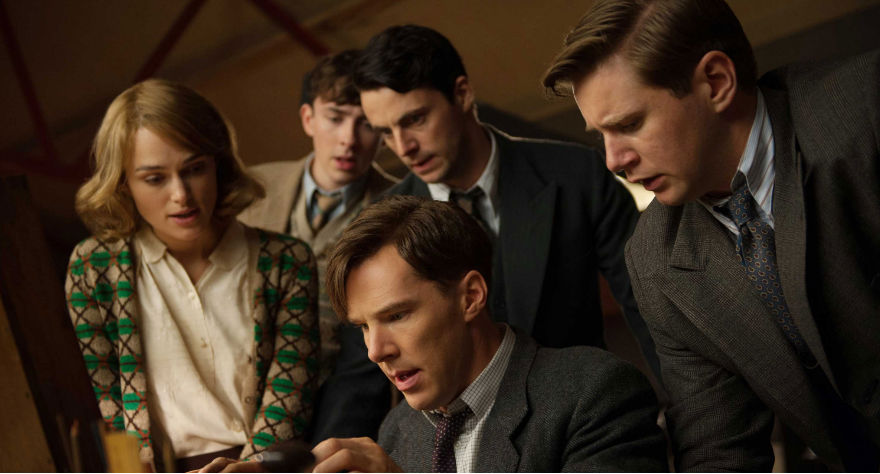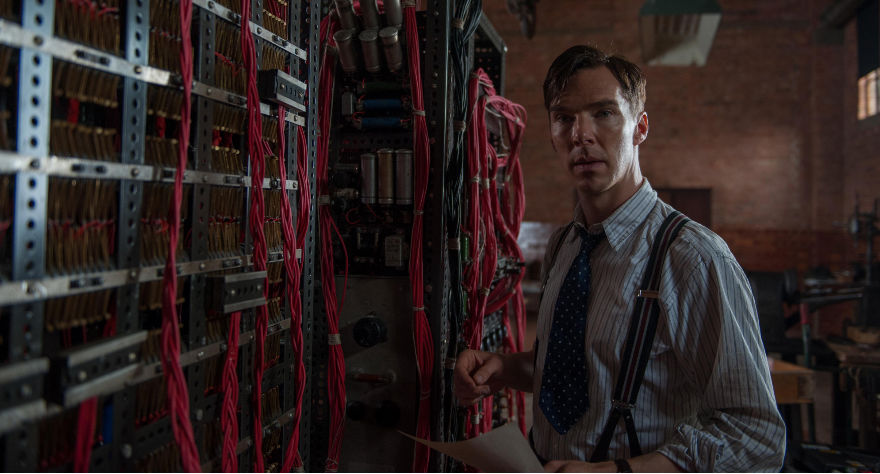
Cumberbatch is terrific yet again in this conventional prestige piece about a beautifully unconventional man.

Cumberbatch is terrific yet again in this conventional prestige piece about a beautifully unconventional man.
English mathematician Alan Turing’s life was about as extraordinary and fascinating as they get in modern times. In fact, modernity owes a lot to Turing, who in the 1930s began dreaming up something called a “universal machine”. A “digital computer”. In addition to getting the ball rolling on creating the devices that permeate every goddamn minute of our daily lives, he was also a brilliant cryptanalyst and helped the Allied forces defeat Germany by cracking the Nazi’s Enigma code, which they used to transmit encrypted messages within their ranks. He was the definition of a hero, though his pivotal role in ending the war was kept a secret for many years. He was convicted of being homosexual in 1952 by the British government and put on hormonal treatment to temper his libido. He killed himself two years later.
Like I said: extraordinary and fascinating. Turing’s life was one of deep complexity, but with The Imitation Game, director Morten Tyldum and screenwriter Graham Moore prune and polish his story down into an accessible, digestible prestige piece. They take a wholly unconventional life and present it conventionally, and while the film takes very few risks and won’t blow your mind like, say, Turing’s papers on artificial intelligence, it just…works. The film really, really works. And after all, the ultimate goal here is to up Turing’s visibility in the social consciousness so that we don’t forget his invaluable contributions and, more importantly, the injustice that tragically shortened his life (he was 41 years old when he died). What better way to spread the word than with a movie that’s approachable, suspenseful, and well-acted?
Benedict Cumberbatch is given the honor of portraying Turing on screen, playing him with emotional complexity, nuance, and sensitivity. He’s terrific, and without his presence the film would likely deflated. We see flashbacks of Turing’s early years when at boarding school where he fell for a boy named Christopher, who introduced him to the art of cryptography, as well as glimpses of his final years, pre-conviction, as he sits in an interrogation room with a detective who suspects high treason rather than homosexuality. But the film largely concentrates on Turing and his Enigma team at Bletchley Park, the British military’s code-cracking hub, as they desperately rack their brains to crack Enigma under threats of shutdown by the dastardly Commander Denniston (Charles Dance).

Cumberbatch’s Turing is a vaguely autistic outsider who’s at once intellectually superior and socially inept. His team at first finds him insufferable; his mind works on too high a level to recognize even the tiniest social cues. The jokes derived from Alan’s inability to register sarcasm recall Drax from Guardians of the Galaxy, but with more pathos lying underneath the laughs. When one of his team members, John Cairncross (Allen Leech) tells Alan they’re all going out for lunch, he doesn’t hear an invitation, but a statement of fact. He comes off as a smug, arrogant jerk, when in truth he simply can’t compute (pardon the pun). In addition to Cairncross, the group also includes playboy chess champ Hugh Alexander (Matthew Goode), sole woman member Joan Clarke (Keira Knightley), and young Peter Hilton (Matthew Beard).
What eventually endears Alan to the rest of the crew are his unimpeachable contributions to the fight against Enigma. He builds an expensive proto-computer (named Christopher, curiously) with government money, prompting Denniston to literally pull the plug and promise to kick Alan off of the project for good. Hugh and the rest of the lads come to Alan’s defense (at the last minute, dramatically) and barely save Alan’s hide. With a bashful smile, he realizes he’s made some true friends. The film is most engrossing when it focuses on the team’s race against the clock as they scurry around Bletchley, giddy about one of Alan’s breakthroughs. These moments are truly thrilling and ignite the film just as it begins to meander.
What’s missing from the story, however, is a true sense of what’s at stake: millions of Allied soldiers’ lives. The intrepid men with guns on the ground feel so distant that you almost don’t notice how absurd it is for the Enigma team to “go get some lunch” as young men and women die every minute. The film was made for under $20 million, so it’s understandable that we don’t get a full portrait of the war (the film occasionally glances at military vehicles in action from afar), but it feels like more could have been done to emphasize the urgency of the mission.
What the film is really about is the beauty of unorthodox thinking, something the British government took painfully for granted in their appalling mistreatment of Turing following his “crimes” of homosexuality (he got pardoned by the Queen just last year). There’s a mantra in the film that’s repeated three times: “Sometimes it’s the people who no one imagines anything of who do the things no one can imagine.” It’s clumsily written and doesn’t exactly roll off the tongue (thank goodness for Cumberbatch’s always-impeccable delivery), but the sentiment carries value.